 VIDEO PODCAST: John Dante Prevedini leads a discussion about Classical Music and Artificial Intelligence, including contributions from George Coulouris, Michael Stephen Brown, April Fredrick, Adrian Rumson and David Rain.
VIDEO PODCAST: John Dante Prevedini leads a discussion about Classical Music and Artificial Intelligence, including contributions from George Coulouris, Michael Stephen Brown, April Fredrick, Adrian Rumson and David Rain.
 PODCAST: Join Jenna Orkin, Maria Nockin, John Daleiden, Gerald Fenech, Julian Jacobson, Patrick Maxwell, Giuseppe Pennisi and Mike Wheeler for a fascinating fifty-minute audio only programme.
PODCAST: Join Jenna Orkin, Maria Nockin, John Daleiden, Gerald Fenech, Julian Jacobson, Patrick Maxwell, Giuseppe Pennisi and Mike Wheeler for a fascinating fifty-minute audio only programme.
- Libor Pešek
- Amoris International
- Michael Nebe
- Latin
- Albert Roussel
- Aaron Rabushka
- Phoenix Arizona
- Wilmington
La traviata in Strasbourg
ANDREAS REY, in his first report for Classical Music Daily, has mixed feelings about a 2025 Alsatian production of Verdi's famous opera
After its premiere in Dijon in collaboration with the Orchestre National du Rhin, Verdi's La traviata has arrived in Strasbourg. If the Burgundian production was disappointing, in terms of staging, performers and conducting, the Alsatian revival has been far more successful. Admittedly, many of the elements of German director Amélie Niermeyer's Dijon production remain, such as the parties in the building under construction in the eighties, the partygoers in gold stilettos and rhinestones, ending up bloodless in the final acts, and even the poor bugger with the canine mask and demeanour, but the Strasbourg production has blended them into a less crude staging.
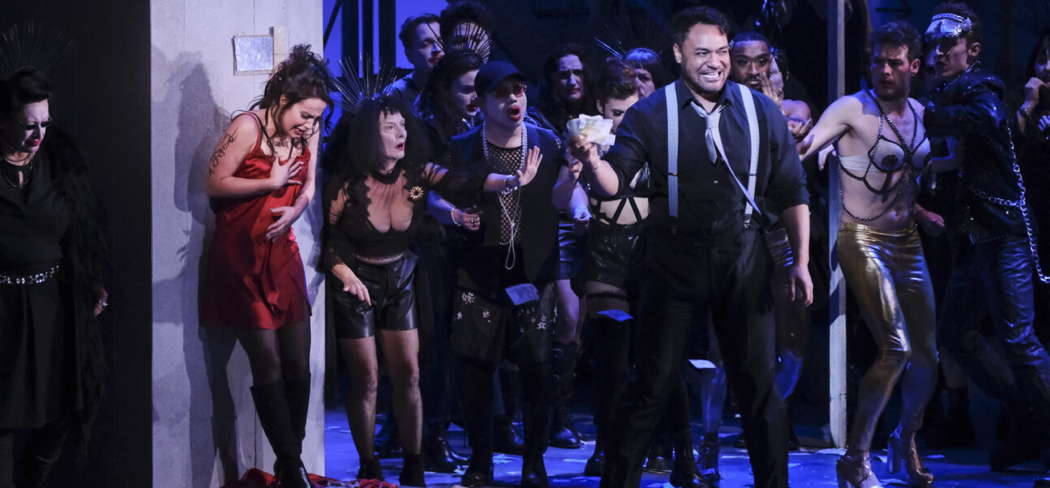
A scene from La traviata in Strasbourg. Photo © 2025 Klara Beck
The parallel between the AIDS years and the syphilis years is a cliché that it would have been wiser to use other than the oft-repeated moralistic perspective of the punishment of debauchery by these diseases. After all, they didn't only strike in these festive circles. And the beginning of Act II, during which Alfredo and Violetta drink cocktails on deckchairs, also raises questions, as this behaviour does not seem to be that of people willing to disregard their former way of life. Nonetheless, Strasbourg's turnaround is essentially due to the acting, which is more natural than in Dijon.
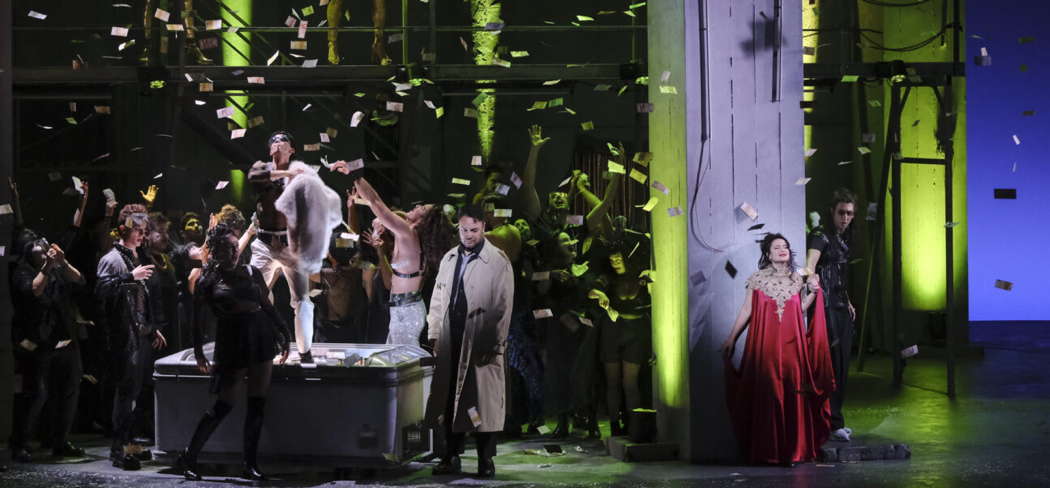
A scene from La traviata in Strasbourg. Photo © 2025 Klara Beck
First of all, we must salute Russian soprano Julia Muzychenko, who finally plays a woman whose illness progressively handicaps her movement in the last act.
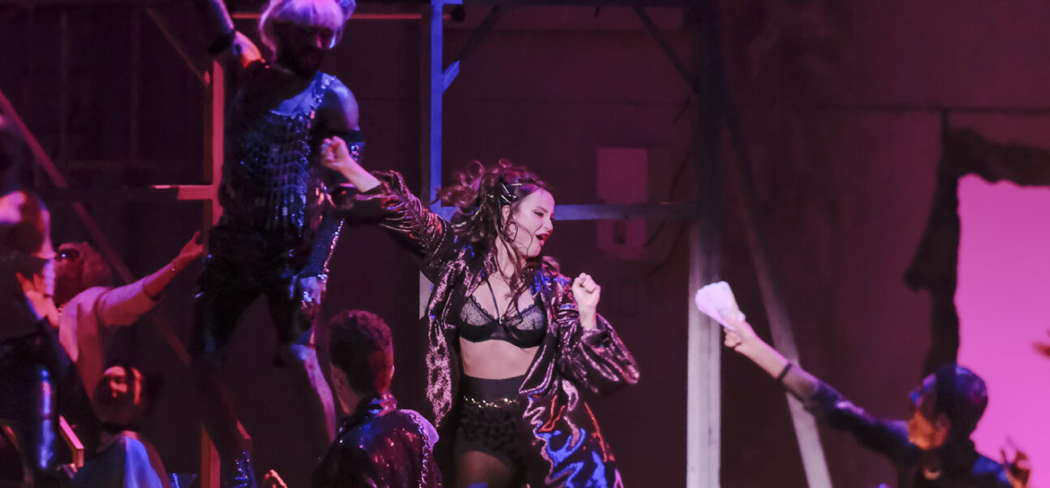
A scene from La traviata in Strasbourg. Photo © 2025 Klara Beck
We would have liked Nadine Sierra at the Bastille earlier this year, or her colleague Melody Louledjian in Dijon a short while ago, to have done the same. And Italian baritone Vito Priante as Giorgio Germont, in his encounter with Violetta, is not just a patriarch lecturing his son's mistress, but, like Ludovic Tézier at the Bastille, a man explaining the consequences of his present concubinage. Unfortunately, Samoan tenor Amitai Pati's Alfredo Germont remained rather uncertain in his character's progression. He only came into his own in the final act, including vocally.
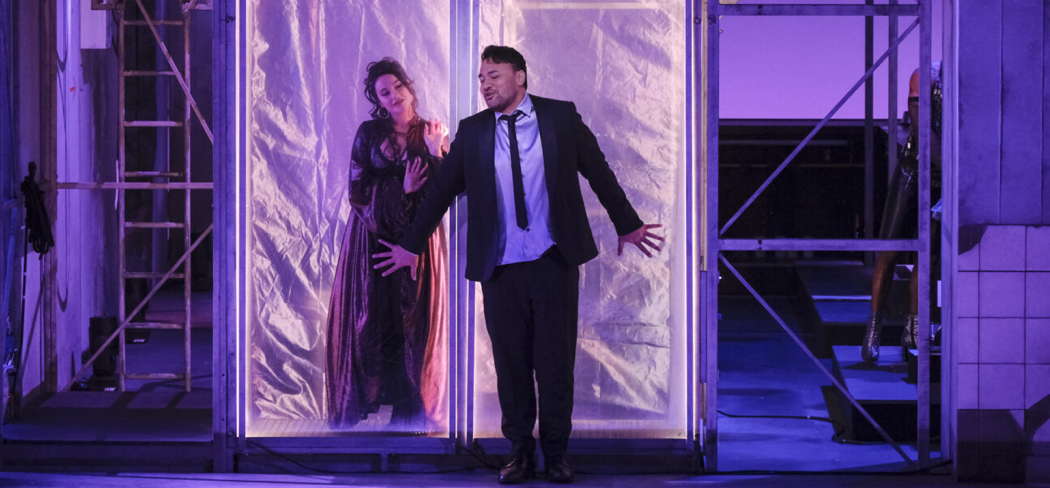
A scene from La traviata in Strasbourg. Photo © 2025 Klara Beck
But it is above all musically that the production of this Traviata has improved. Like Brazilian-Israeli conductor Debora Waldman in Dijon, Austrian conductor Christoph Koncz in Strasbourg maintained a highly Mozartean approach to the score, relying essentially on the violins, but unlike his colleague, the work on the winds, and particularly the brass, as Simone Young is currently demonstrating in Don Carlos at the Opéra Bastille, is always very delicate in Verdi, and can easily become fanfare noise. Hers is still clumsy, but her conducting remains elegant and racy, with Delacroix-like colours of great interest.
And here, too, we must applaud Julia Muzychenko. Admittedly, her voice remained a little too acidic during the first part of the first act, contrasting with that of her Samoan colleague, who is too basic to use the metaphor of chemistry. Hers opened up, like a young wine that needs to be shaken in a decanter to release all its aromas, in her first solo, becoming less aggressive, more legato and rounder. Her Traviata aria in the last act, 'Oh, come son mutata!', became more touching, and her encounter with Giorgio Germont more authentic.
The evening's other pleasant surprise is Vito Priante's Giorgio Germont, whose tone is certainly firm, but never imperious with Violetta, and harsh when reprimanding her son.
We would have liked Amitai Pati's voice as Alfredo to have been revealed much earlier than in the last act, to have been more audible opposite Violetta in the first, firmer in the group scenes and more assertive on his own. His great aria 'Lunge da lei per me non v'ha diletto!' at the start of Act II seems almost indifferent, alas, and his rage during the second party anecdotal. He only really becomes interesting during Violeta's death in the third act, his voice finally firm enough to stand up to those of Violetta and Polish bass-baritone Michal Karski as Doctor Grevil, whose deep, almost cavernous bass holds our attention.
Apart from the Annina of Uruguayan soprano Ana Escudero, whose frank, clear timbre catches the ear, we'd have liked to hear more colour in the other secondary roles, such as the Baron Douphol of French baritone Pierre Gennaï and the Flora Bervoix of Franco-British soprano Bernadette Johns.
However, throughout the opera, the chorus members seemed to be enjoying themselves, remaining united and comprehensible despite all their stage acting.
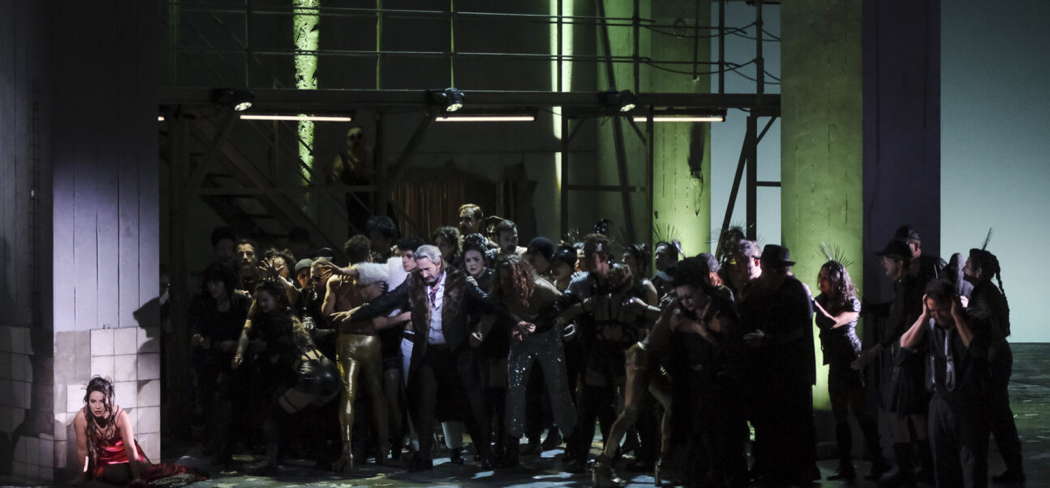
A scene from La traviata in Strasbourg. Photo © 2025 Klara Beck
The main performers, as well as the conductor and orchestra, rose above their verve to deliver a lively opera, and the production was saved.
Copyright © 22 April 2025
Andreas Rey,
Strasbourg, France



